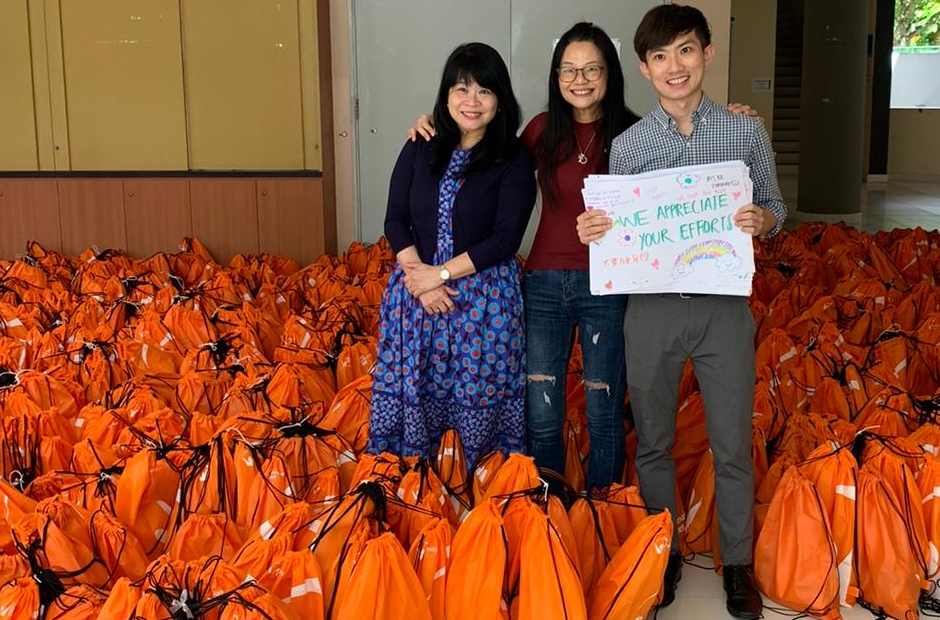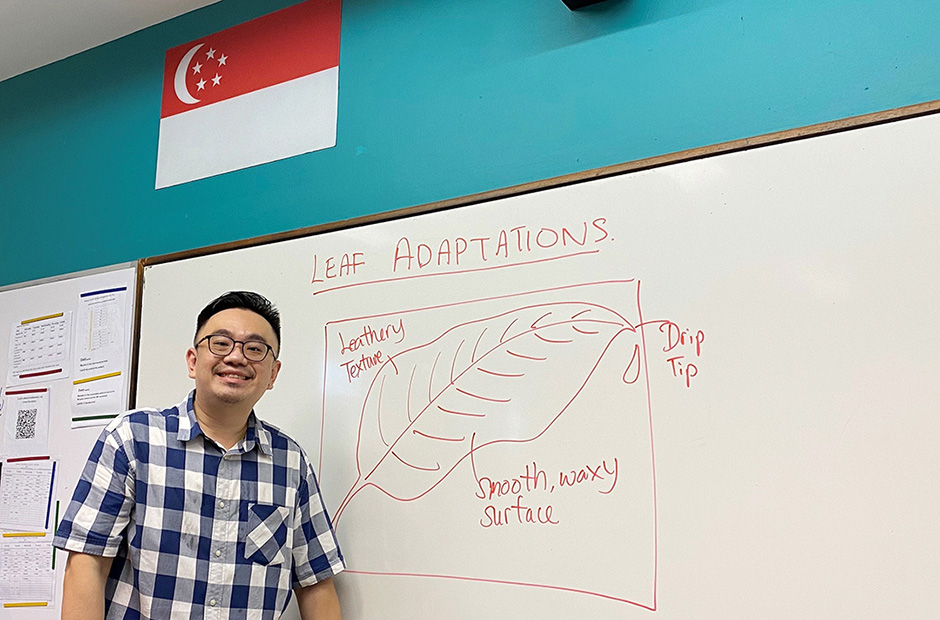Q: What was the situation like when SARS hit? Can you describe some of the challenges you had to tackle?
Dr Shirleen Chee: I was then a newly minted principal at Bukit Panjang Government High School (BPGHS) and SARS and the subsequent unfolding of events were not something that any Principal’s training course, can prepare you for.
People were fearful and anxious as some people who contracted the disease succumbed to it. Health care workers were also shunned as a result.
When the Pasir Panjang Wholesale Centre was shut down for more than a month due to the discovery of SARS cases at the site, I remember having to send a few students home, because their parents worked there. These students had to stay home and monitor their own temperature.
A short while after that, I received a call from a parent who demanded to know if the school can guarantee the safety of her child since the classmate’s parents worked at the Pasir Panjang Wholesale centre.
You see, SARS had brought out the worst in us. For this parent, it led to fears and this could snowball into selfish actions and unreasonable reactions. I had to assure that parent that these students were well when they were in school and had not reported any fever. I went on to advise the parent to take the high ground of educating her own son and learn to show concern for the classmates who had to stay at home.
Q: How did all members of the school work together to alleviate this situation then?
Dr Chee: It was in this trying time that I saw our students’ compassionate nature shine forth.
For example, one of the first things the students did was to thank the healthcare workers for their bravery in their battle with SARS. They were very clear that it was their hard work which allowed them to continue to have their CCAs (and this was important to the students)
A slideshow of CCA photos, with words of thanks, was sent to the healthcare workers at Tan Tock Seng Hospital (TTSH). From the students’ point of view, CCAs gave them that sense of normalcy. They were very aware that their CCAs could continue because our healthcare workers were out there fighting the battle at the frontline.

Some of the slides from the PowerPoint presentation that students from BPGHS sent to TTSH. It contained pictures of CCAs in the school with captions that expressed their gratitude to the health care Workers.
Another student, who was talented in art, made a sculpture symbolising the united efforts of all, and the school also presented this to TTSH.

A BPGHS student created this sculpture to symbolise the efforts of everyone involved in the fight against SARS.
What we learnt then from SARS was not mere cognitive lessons about the virus but life lessons which contributed to the process of beating SARS.
Students saw the making of history – how a nation journeyed from fear to courage and how everyone can do their part – including staff, students, School Advisory Committee (SAC) members, stakeholders and alumni.
Q: How is dealing with the COVID-19 situation different from fighting SARS back then?
Dr Chee: The Internet and other computer technologies were not as advanced as they are now, so it took longer for students and their parents to get up to speed with information about the virus or social hygiene practices. Not everyone had access to computing devices. Internet bandwidth was very limited. Homework had to be delivered by mail.
Today, temperature-taking exercises are a given; all students own an oral digital thermometer. Sanitisation and disinfection have become familiar routines, since this is done when there are occurrences of Hand Foot & Mouth Disease (HFMD). We can roll out virus screening and isolation exercises quickly as we have already put them into practice before.
Today, almost everyone has access to the Internet at home, students can learn and catch up on lessons using platforms such as, the Student Learning Space (SLS), even if they are not physically in school.
The rise of video conferencing software such as ZOOM and Google Meet allows students to meet with their teachers online to learn and discuss their studies, even though they are apart.
Of course, schools also have an online platform for parents, like the Parents Gateway, and this helps to keep an open channel of communication between parents and teachers. In a crisis like COVID-19, this is especially critical because scenarios can change quickly and we need stakeholders to have access to accurate and reliable information.
Q: The Internet has helped teachers to connect with students and parents, but has there been any downsides to that?
Dr Chee: The Internet has presented some challenges. With the existence of many channels of communication, including social media, real news may sometimes contain inaccuracies, and worse, fake information can masquerade as truths.
Fake news can result in extreme panic and fear, and if they go viral, it may result in terrible consequences.. Adding to that, some parents are also influenced by online advocates of different views and may insist on imposing their views on the schools. It is therefore critical that we should always keep our communication channels open.
Q: How are your students at Anglo-Chinese Junior College (ACJC) handling the COVID-19 situation?
Dr Chee: The students are turning this situation into opportunities for them to show their support and gratitude to the various people who are helping to fight the COVID-19 battles.
For example, my students designed encouragement posters for different groups of people affected by the COVID-19 situation, such as the health care workers battling COVID-19 on the frontlines; ACJC cleaners who have had to cope with an increased cleaning load.

The students demonstrated their support to the ACJC operational support staff, by presenting them with a hand-drawn poster filled with encouraging notes and packages filled with tea and other gifts.
In addition, the students also packed over 3,000 care packages for the health care workers as well as hosted tea session and presented the college cleaners with tokens of appreciation.

ACJC students formed an “assembly line” to create over 3,000 care packages for health care workers.
Q: Do you see a difference in the way students and teachers tackle challenges during COVID-19 as compared to SARS?
Dr Chee: Our students today are well-informed because most of them are armed with smartphones that give them access to information anywhere and anytime. With the access to the abundance of information, there is also a greater need for them to discern what is true and what is false. I must say that our students today are quite savvy in the identification of fake news too.
For the teachers, I find that they are more ready to experiment with the use of different ICT tools. They are not content with just taking videos of themselves teaching but also work to keep students engaged, and foster collaborative learning. I am very encouraged by many of my teachers who are near retirement, and have experimented with several digital tools during Home-Based Learning (HBL), to provide prompt feedback and make their lessons more engaging.
When COVID-19 hit, the teachers had to redo a lot of things. They had made plans in 2019 for some of the key events in 2020. Many changes had to be made. The JC1’s Student Orientation which was typically a high point had to be carried out in the midst of social distancing. The College’s milestone events, our Founder’s Day celebrations, the FUN-O-RAMA that typically see a few thousand people (our alumni, friends and family members) turning up in full force at the college had to be postponed/ cancelled. .
The commemorative events, typically formed a large part of student memories, were largely demolished by COVID-19. In addition, online lectures, blended learning, both asynchronous and synchronous learning came into the picture. You can see the fatigue on the faces of the staff. I really do have to thank them for their dedication, sacrifice and for being able to adapt quickly.
Q: Are there any learnings that you are taking away from the current experience? What would be your message to future principals in handling crises?
Dr Chee: The work in the education sector deals with lives. Walk our talk. Our students see how we conduct ourselves. Do we do what we ask our students to do? It is easy to talk and it is better if we truly walk that journey we talked about. For educators, we demonstrate this walk by the consistency of what we say and do. It is about being true to our values all the time.
Be authentic. This has a lot to do with humility. Our relational transparency goes a long way, especially in an evolving situation when we are not sure what will happen next, and our plans are changing so rapidly. We should always assure our colleagues – admit that like them we are uncertain and unsure when we will see the light at the end of the tunnel. But that does not mean that we do not do our best or be less caring.
Remember that the ordinary folks can do much in extraordinary times. Overcoming extraordinary times like COVID-19 is possible only with the combined efforts of all of us and not just the effort of one extraordinary being. Since the past has shown that the present travails can be overcome for a better and healthier future, let us ride on the lessons of the past, persevere in the present, and step into our desired future. We walked out of SARS as a nation. We will walk out of this current situation too.
As for me, I know COVID-19 has taught me not to take for granted the many simple things in life – giving a hug, talking a walk, meeting with friends over coffee and the breath of fresh air (without having to wear a mask).






.jpg)